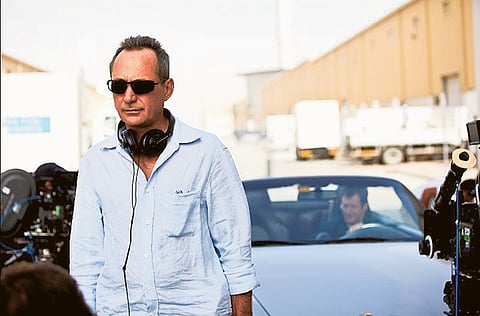Labour of love
Tim Smyth of Filmworks shares his experience of shooting Mission: Impossible - Ghost Protocol in Dubai

It's like setting up a multi-million business empire, owning it for three months and then closing it down. That's how Tim Smyth describes his company's work facilitating local film production for high-profile movies such as Mission: Impossible - Ghost Protocol.
Last night, Smyth's labour of love premiered at the Dubai International Film Festival to much global acclaim.
"I thought it was fantastic. I think they've raised the bar on the franchise. I enjoyed the writing, acting and how Dubai was so fantastically depicted in the film. All our hard work's paid off in ways I could have never dreamed of," Smyth said after the premiere.
The Dubai sections of the film — which roughly translated to 40 minutes in the film, took more than 10 months from preparation to wrap-up, he says.
"It's definitely the biggest project that's ever happened in the Gulf," he says of the filming. "It's very technical and takes a lot of preparation. There are many locations, many units filming and a lot of sequences."
Although unwilling to go into details, Smyth, Filmworks CEO, whose past projects include facilitating for Hollywood films Syriana and The Kingdom, is all praise for the MI4 lead.
"Tom is an extremely dedicated actor and very hardworking. He does all his own stunts," he says. "But there are a lot of technical aspects, on safety for instance, for him to execute the stunts. And that is where we come in."
But that's not all. Filmworks' responsibility included everything from securing script permission and shooting permits, with relevant authorities, before production began. Then there is taking care of the shooting ("everything from A-Z"), managing locations, the local crew and hiring additional crew to fill in shortcomings.
"There were aerial units, ground units and the A-units, which consists of the main actors," he explains.
Locations included the Burj Khalifa, Satwa, the DIFC, Meydan and also scenes shot in the desert, the Creek, in Bur Dubai and on highways. Although Smyth wouldn't confirm it, the Jumeirah Zabeel Saray hotel on The Palm was used as a setting for a hotel in Mumbai.
More than 450 crew members were involved over 10 months, although the main stars were only in town for six weeks. Additionally, 600 extras were cast from the UAE.
But for Smyth, who set up Filmworks 13 years ago, despite the star status of his last project, it was business as usual.
"I had to make sure things were running properly and that we were delivering as a Dubai unit," he says.
Having recently wrapped up Djinn, the Tobe Hooper-directed Image Nation Abu Dhabi film, Smyth says Hollywood projects started flooding in after 2005's Syriana was filmed here.
"Our biggest advantage is our locations. We have both modern and old Arabia," he says.
To cash in on this trend, however, the UAE needs to offer more incentives, Smyth adds.
"Every city is competing with another city so incentive programmes will give us an advantage. South Africa for instance offers huge incentives and hosts eight to nine big Hollywood productions annually.
"We need to take advantage of this momentum."
Sign up for the Daily Briefing
Get the latest news and updates straight to your inbox

